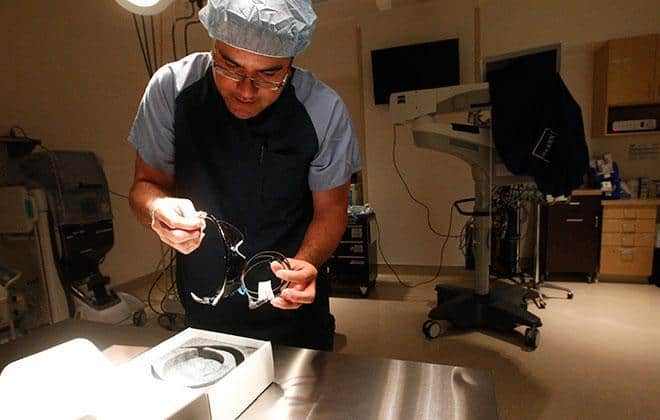
Ronald M. Walker, clinical director of the Eye Surgery Center of Hawaii, unwraps the Argus II artificial retina inside one of the center’s operating rooms. Photo by Jamm Aquino.
Star Advertiser
March 24, 2015 | By Kristen Consillio
It will be the first use of the Argus II artificial retina in the Asia-Pacific
What seemed far-fetched a few decades ago will become a reality Tuesday for a blind woman whose sight will be restored through a bionic eye implant at the Eye Surgery Center of Hawaii.
Honolulu ophthalmologist Gregg Kokame, president of Retina Consultants of Hawaii, will be leading a surgical team to perform the first implant of the Argus II artificial retina, known as the bionic eye, in the Asia-Pacific region. The bionic eye is the world’s first retinal prosthesis approved by the U.S. Food and Drug Administration.
The technology, developed by Second Sight Medical Products Inc., uses a prosthetic retina to artificially restore vision to those with retinal blindness from a disease known as retinitis pigmentosa.
Doctors implant a chip on a patient’s retina that receives visual signals from a camera mounted on a device resembling futuristic sunglasses. The signals from the camera stimulate the inner retina through the Argus II, which then sends the signals through the optic nerve to the brain, allowing patients to see visual images of light and shapes. The technology does not, however, restore normal vision.
“This is a revolutionary development in the field of retinal surgery where for the first time a patient who is completely blind will have the ability to see again using a retinal implant,” Kokame, also president of the Eye Surgery Center of Hawaii, said in a press release. “I am extremely honored to be the first surgeon to perform this procedure in the Asia-Pacific region and hope we will have the opportunity to restore vision for many patients each year.”
The Eye Surgery Center of Hawaii, a specialty surgery center at Iwilei’s Dole Cannery, is a company of SKAI Ventures, a Hawaii-based venture accelerator focusing on biomedical and biodefense technologies.
“By making this surgery available, it will help numerous patients throughout the Asia-Pacific region with retinal blindness,” Dr. Hank Wuh, chief executive officer of SKAI Ventures, said in the release.
The sight-restoring device has a potential market of more than 8 million people, including 375,000 with retinitis pigmentosa and 2 million with age-related macular degeneration, according to the Los Angeles Times.
In Hawaii there are only about 50 patients with advanced retinitis pigmentosa resulting in blindness, Kokame said. However, the center hopes to attract patients from Asia and other Pacific nations. The total cost for the procedure is estimated at $160,000.
For more information about bionic retina implants, call 487-8928.